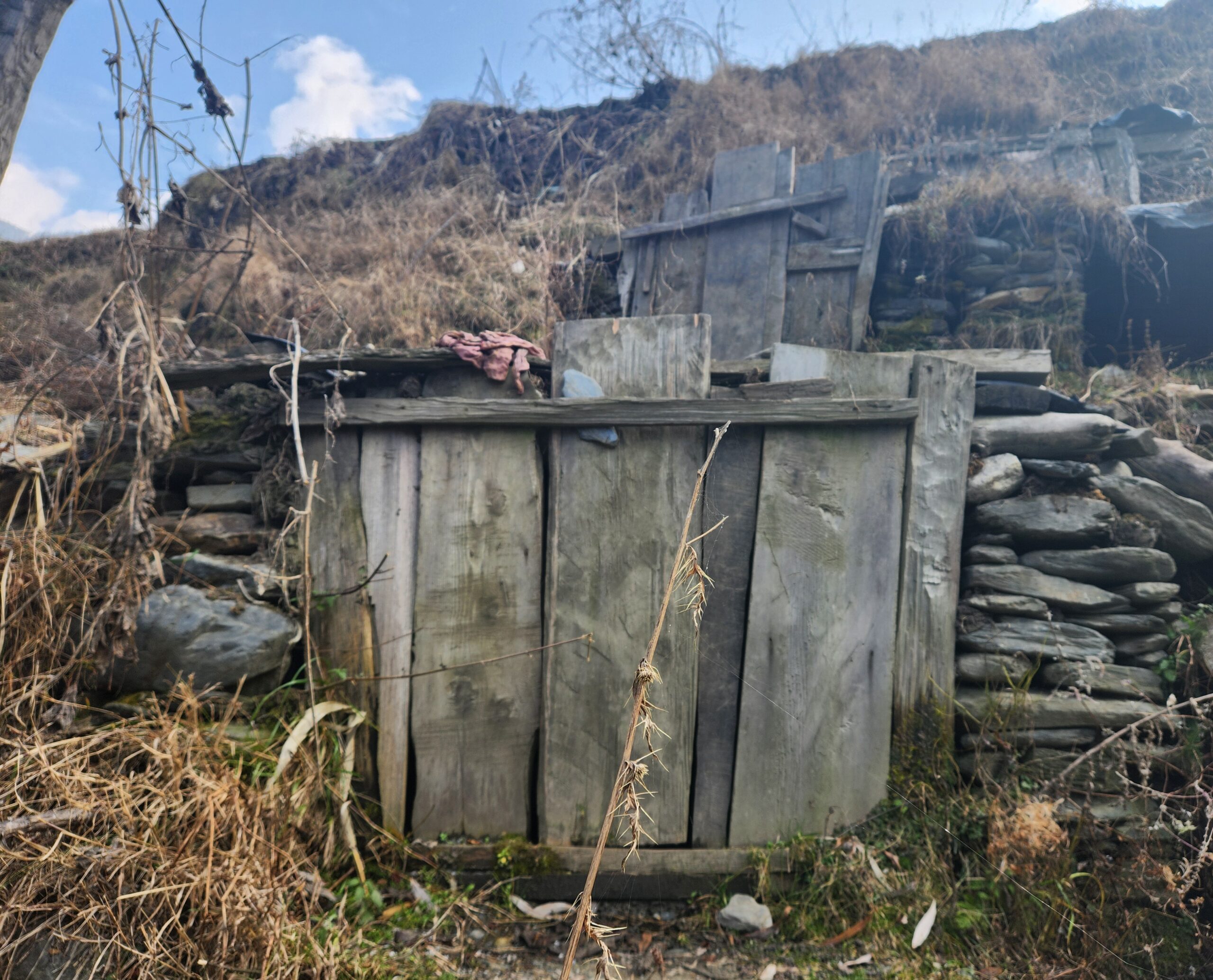Nestled within the enchanting landscapes of Baramulla in Kashmir, a mere 42 kilometres away, lies the timeless village of Dudran—a haven untouched by the frenetic pace of modernity. In a world fixated on technological leaps, Dudran emerges as a sanctuary of tradition and resilience, a place where the rhythmic pulse of life beats to the age-old wisdom of its women.
Here, amidst the serene beauty, these guardians of heritage have elevated preservation to an art form, mastering the delicate dance of sustaining dairy treasures without the crutch of modern refrigeration.
The secret to their triumph lies in the enchanting embrace of Doud Khot—natural fridges sculpted from stones—a whisper from the past echoing through the heart of Dudran’s time-honoured legacy.
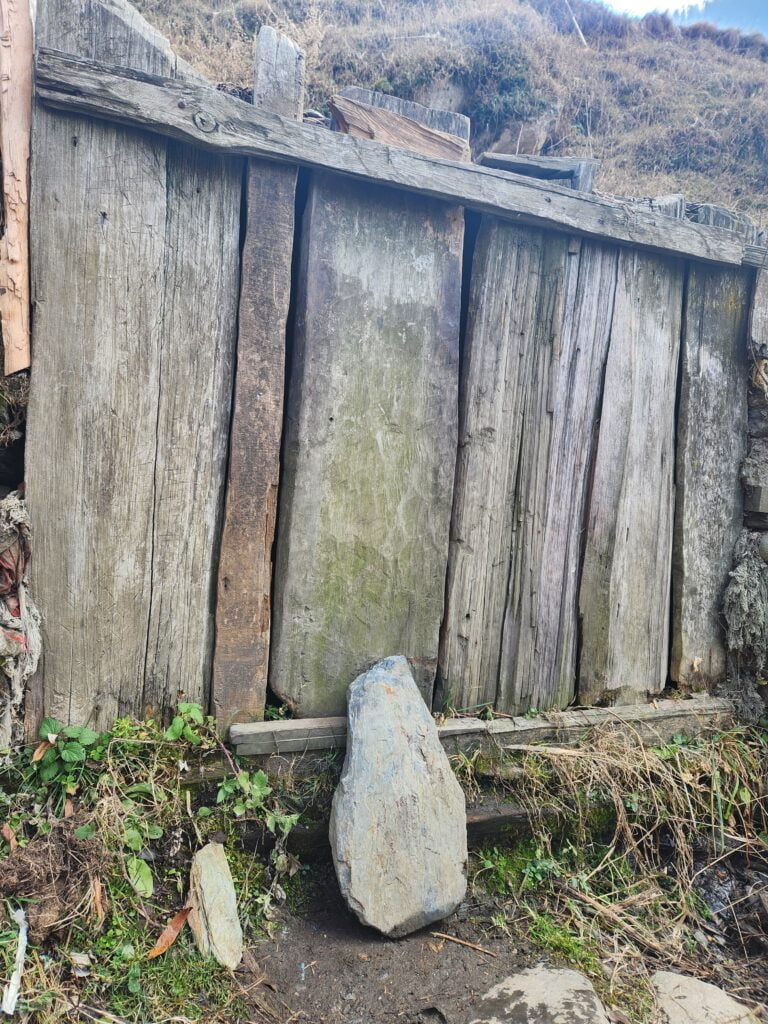
For decades, the women of Dudran have been relying on Doud Khot to store their milk, cheese, and butter. Fameeda Begum 59 years old, a resilient homemaker and astute entrepreneur in the picturesque village of Dudran, proudly recounts her unique journey, stating, ‘Our reliance on Doud Khot transcends generations, evolving from a mere tradition to a thriving source of income.’
The women of Dudran have honed their expertise in the meticulous maintenance of Doud Khot, skilfully regulating its temperature to create an ideal environment for preserving their prized dairy products. This age-old technique not only preserves their cultural heritage but also serves as a sustainable means of livelihood in the face of modern changes.
Women empowerment through Doud Khot
Fameeda reveals her daily routine, saying, ‘To produce butter and curd, I store two or four pots of milk in the cave. After five days, I bring the milk home and churn it into butter.’ Her efforts yield tangible rewards, with Fameeda proudly sharing that she earns up to 20,000 per month by selling wholesome dairy products. What sets their offerings apart is their commitment to purity.
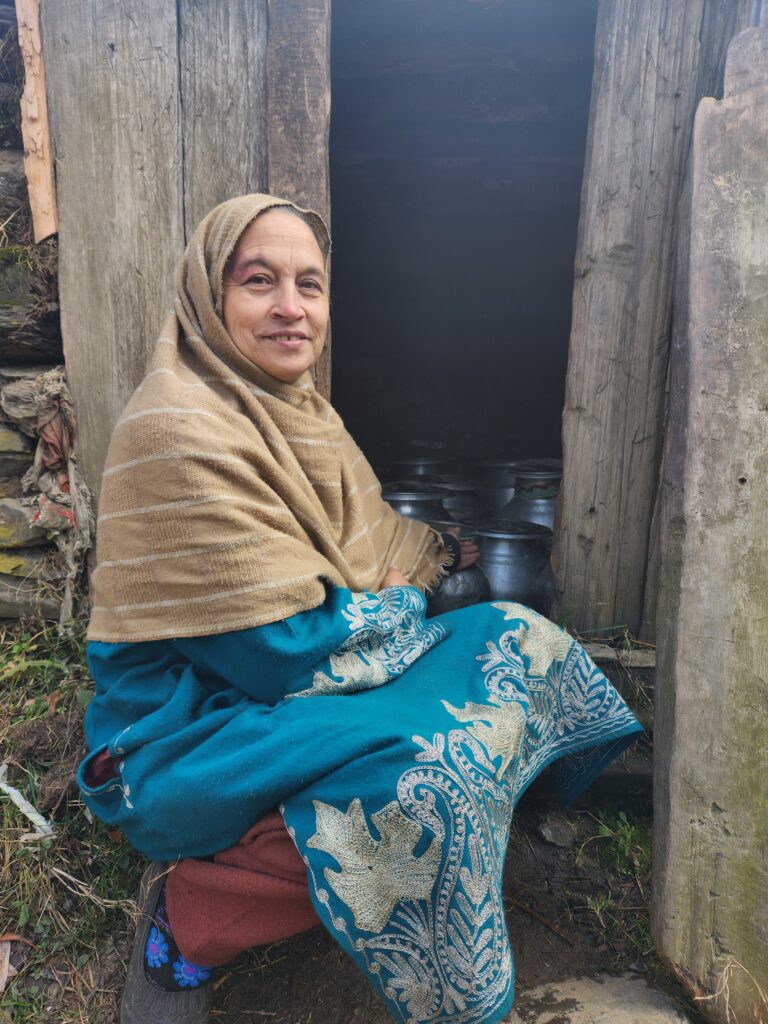
Devoid of any artificial preservatives, the dairy products emerging from Dudran’s Doud khot are a testament to natural goodness and are rich in health and nutrients.
In the heart of winter, when sub-zero temperatures prevail, fresh milk finds a haven within earthen or steel pots snugly stored inside the khots. This ingenious practice not only maintains the warmth of the milk but also facilitates its effortless transformation into curd.
Dudran’s Doud khot has thus become a symbol of sustainability, weaving together tradition, entrepreneurial spirit, and a commitment to purity. As these women navigate the delicate dance between heritage and modernity, this stands as a living testament to the enduring strength of age-old practices in the face of a rapidly changing world.
It emerge as rustic sanctuaries, resembling small cave-like structures strategically positioned over or near the village’s natural springs. These humble abodes, crafted with stone walls and sturdy wooden roofs, serve as the beating heart of Dudran’s dairy economy. Acting as a natural refrigerator, the Doud khot maintains optimal coolness, ensuring the freshness of the villagers’ cherished milk and its derived products. The thoughtful addition of wooden fencing further shields these treasures from the curious noses of roaming animals, creating a harmonious blend of tradition and practicality.
In Dudran, the economy revolves solely around cow milk and its various delectable offshoots, turning these unassuming Dodh Koths into the epicentre of a time-honoured dairy trade that sustains livelihoods and preserves a way of life.
One of the primary advantages of Doud khot lies in its ability to keep milk and dairy products fresh for several days without the need for electricity. In a world where refrigerators are ubiquitous, Dudran stands out for its commitment to sustainable and climate-resilient practices.
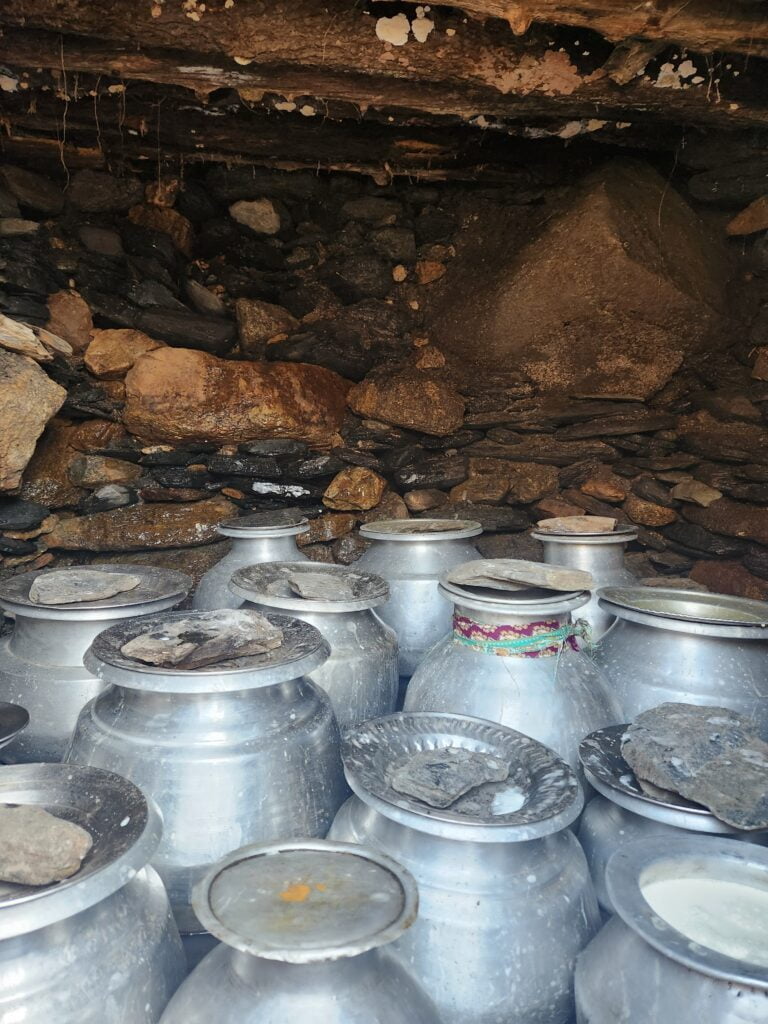
Saima Akhtar, another resident of Dudran, articulates, ‘Within our village, the absence of refrigerators is conspicuous. For years, we have relied on Doud khot, and remarkably, it meets our needs with utmost efficacy.’
Akhtar further mentions, ‘This indigenous practice has been seamlessly integrated into our daily lives, proving its reliability over time. The absence of refrigeration technology has not hindered our lifestyle; instead, Doud khot has been our faithful companion. Its consistent functionality has made it an integral part of our community, illustrating that simplicity often begets efficiency. In our village, where traditions endure, Doud khot remains a symbol of resourcefulness and practicality.’
The Dodh Koth is not merely a means of preserving dairy products; it has become a symbol of self-sufficiency and empowerment for the women of Dudran. Through their innovative use of this traditional technology, they have created a local economy centred on homemade cheese, butter, and other dairy delights.
In this quaint village, resilience and resourcefulness shine through the lives of women like the determined protagonist, who lives under her parents’ roof. Henna Jaan 35 years old reveals, ‘Our source of sustenance may be unconventional, but it’s our lifeline. Despite the absence of a regular income, our lives revolve around our cows. Through the magic of Doud khot, we preserve the milk, transforming it into cheese, butter, and clarified butter. These homemade treasures become our commodity, sold to local shopkeepers, ensuring not only our survival but also empowering every woman in our village to earn a livelihood.’
Remarkably, Dudran has carved a niche for itself as a haven of dairy prowess. Every woman contributes to this thriving economy, a testament to their strength and ingenuity. The village’s literacy rate may be modest, and formal education may be a luxury, but Doud khot has become an invaluable teacher, offering practical skills that sustain livelihoods.
In a world where refrigerators remain unknown to some, Doud khot stands as a symbol of simplicity meeting necessity. It has woven itself into the fabric of Dudran, providing not just sustenance but a means for these resilient women to script their own stories of independence and self-reliance.
As we delve into the lives of these women, it becomes evident that Dudran’s Doud khot is more than just a method of refrigeration. It’s a celebration of heritage, a sustainable practice that has adapted to changing times. In an era dominated by machines, Dudran’s women have found a way to blend tradition with entrepreneurship, proving that sometimes the simplest solutions are the most enduring.
A whisper from the past
In a conversation with Haji Ashraf Mohammad, a venerable 68-year-old resident, he fondly reminisces about a tradition spanning decades, remarking, ‘I vividly recall my childhood, when our homes were graced by this natural refrigerator. During the scorching summer months, my mother ingeniously preserved milk and perishables in our very own Dodh Khot.’
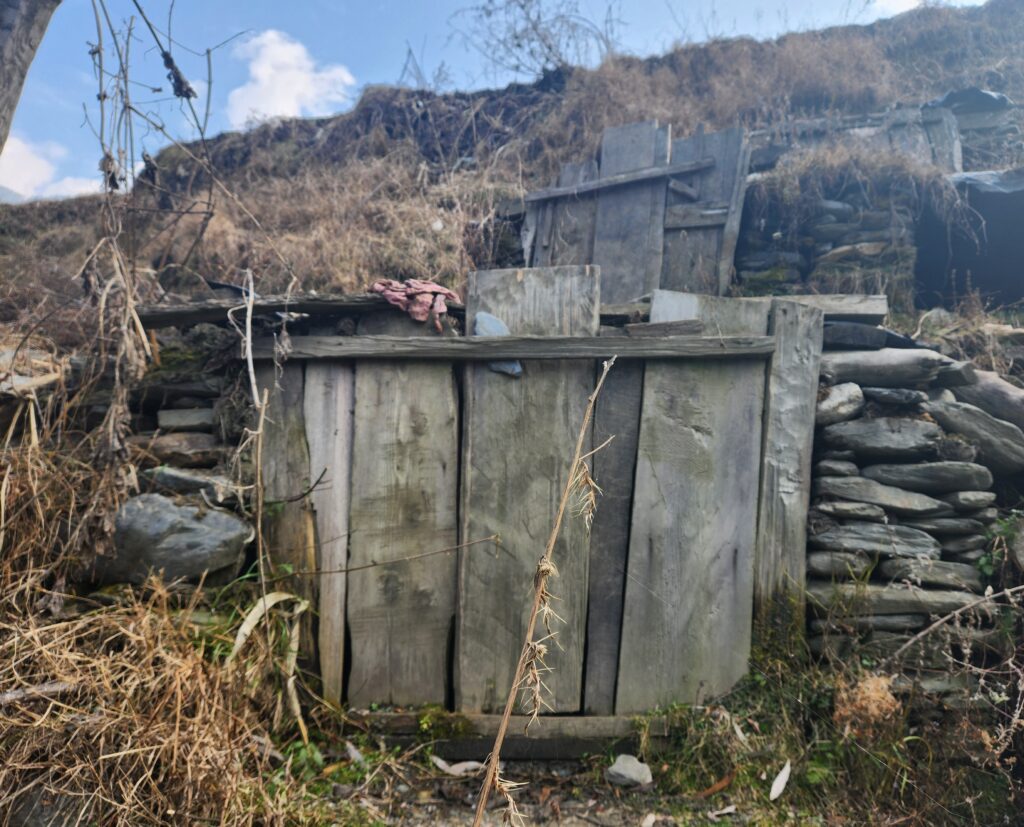
This time-honoured practice, woven into the fabric of daily life, is not just a relic of the past but a living legacy embraced by every household in their village.
Proudly asserting the unique identity of their community, Haji Ashraf shares, ‘In our village, each household boasts its own Dodh Khot, and we wear this distinction with pride. Thanks to the Almighty, the tradition persists, and our new generation is fervently adopting this invaluable practice.’ Their village stands as a singular beacon in Kashmir, proudly claiming the title of the sole community possessing a natural fridge, a distinction they cherish and guard zealously.
With a sense of responsibility and reverence for their cultural heritage, Haji Ashraf expresses, ‘We take immense pride in our natural fridge, and we are committed to passing down this legacy to our future generations. It’s not just a tradition; it’s a testament to our resilience, resourcefulness, and the enduring bond we share with our ancestral practices.’
In an ever-changing world, their Dodh Khot stands as a symbol of continuity, connecting the past with the present and safeguarding a unique cultural heritage for the times yet to unfold.
Dudran’s Dodh Koth stands as a shining example of how communities can thrive by embracing their roots. As the world grapples with the challenges of climate change and sustainability, Dudran offers a timeless lesson – sometimes, the answers people seek are hidden in the wisdom of their ancestors.
